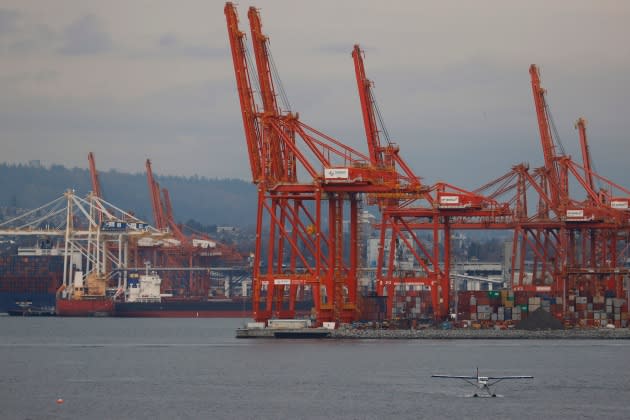Canadian West Coast Port Strike Notice Sends Ripples Through Supply Chains

Unionized Canadian dockworkers could strike as early as July 1 after The International Longshore and Warehouse Union (ILWU) Canada on Wednesday gave employers at 30 Canadian West Coast ports 72-hour notice of its walkout authorization.
Contract negotiations have been in progress since March as over 7,000 longshore workers seek a new collective bargaining agreement with the British Columbia Maritime Employers Association (BCMEA). Union employees have worked without a deal since the previous contract expired March 31.
More from Sourcing Journal
A strike at Canada’s ports, including major gateways like the Port of Vancouver and the Port of Prince Rupert, would come weeks after the ILWU and the Pacific Maritime Association (PMA) in the U.S. agreed to a new six-year tentative contract. Their contentious 13-month negotiations saw various disruptions, but never a full work stoppage.
Earlier this month, 99.24 percent of ILWU Canada members voted in favor of strike action against the BCMEA, which represents 49 waterfront employers across the Canadian province.
The ILWU is focused on resolving issues around outsourcing contract work to non-union workers, port automation, and wages.
In a statement, Rob Ashton, president of ILWU Canada, accused the BCMEA of taking “rights and conditions from longshore workers after having gorged themselves on record profits during the pandemic.”
Similar to the rhetoric issued by the ILWU in the U.S. when West Coast ports saw interruptions at the start of June, Ashton stressed the health risks that dockworkers endured during the Covid-19 pandemic.
“Longshore workers kept this province and the country running during the pandemic and when Canadians were told to shelter in place, our people went to work!” Ashton said. “We worked in difficult and hazardous conditions to ensure that the communities where we live, and all Canadians had the necessary supplies and personal protective equipment to defend against the Covid-19 virus…It is unfortunate that our employers hold us in such contempt.”
The parties are scheduled to continue bargaining with the assistance of Canada’s Federal Mediation and Conciliation Service (FMCS) on Thursday.
The BCMEA says it advanced multiple proposals and positions in good faith, and is open to voluntarily entering a mediation-arbitration process shaped by the parties. The maritime association claims ILWU Canada has declined this binding proposal.
“Despite today’s regrettable development, we remain ready to re-engage with our labor partners through the federal mediation process, with the desire of reaching a fair and balanced deal at the table that keeps our ports stable and goods flowing for Canadians,” the statement reads.
A strike could have ramifications on the North American supply chain, with roughly 15 percent of U.S. inbound and outbound laden and empty containers moving through the Port of Vancouver, according to the Vancouver Fraser Port Authority.
More companies already had diverted volume away from the Canadian ports ahead of the strike. According to data from Everstream Analytics, 67 container vessels arrived at the Port of Vancouver per week in June. This is down from 83 arrivals per week in March, with the number decreasing sequentially each month.
The supply chain risk intelligence platform said prolonged strike action could result in further diversions to U.S. West Coast ports, leading to longer queues and schedule disruptions.
Ironically, over the past year, the Canada ports were a go-to for companies that weren’t sure when West Coast negotiations would produce a new deal, according to Jena Santoro, Americas regional lead, intelligence solutions for Everstream Analytics.
“Up until now, the Canadian West Coast ports have been the main option, or the best option, for diversions,” Santoro told Sourcing Journal. “For retailers, for perishable goods, electronics or raw materials—if shippers needed a quick diversion from Seattle and Tacoma or any of the other U.S. ports on the West Coast, the Ports of Vancouver and Prince Rupert were the answers.”
Santoro said that rerouting shipments north adds less time to the shipment than diverting to the U.S. Gulf and East Coasts. So a potential strike would now force more shipments east for companies electing to keep product away from the U.S. West Coast, causing longer lead times.
“It would be much quicker to go through those Canadian West Coast ports than to go into, you know, Houston or Mobile, Alabama, or any of the Gulf Coast or East Coast ports,” Santoro said.
With the situation in flux, Canadian government officials including Minister of Labour Seamus O’Regan and Minister of Transport Omar Alghabra issued a joint statement urging both parties to return to the bargaining table to reach an agreement.
“Everyone—the employer, the union, the mediators and the government—understands the urgency and what is at stake for Canadians and our supply chains,” they said. “The parties are responsible for moving goods both nationally and internationally, and industries and consumers would feel the effects of a work stoppage.”
